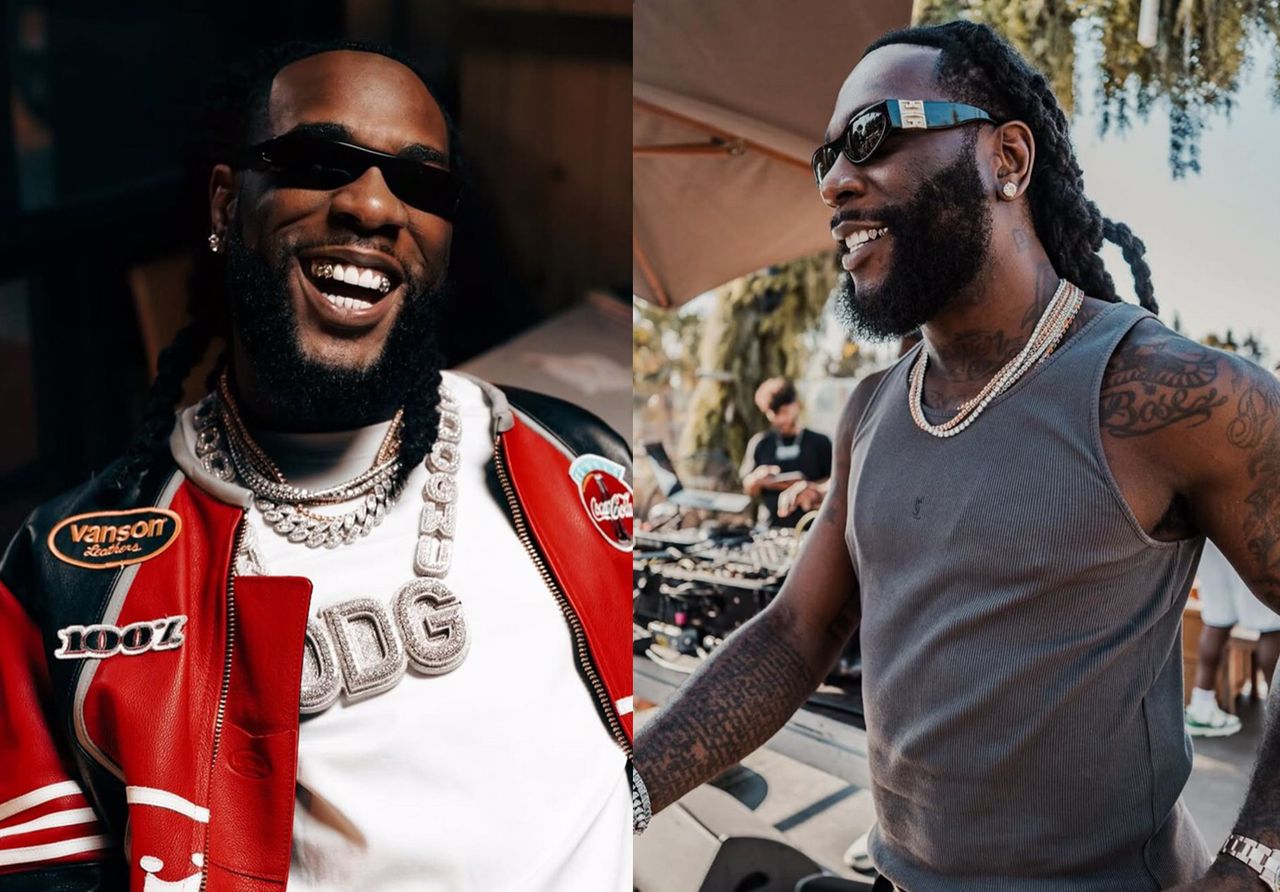
Fela’s Grandson, Made Kuti, Schools Chef Who Insulted His Inter-Ethnic Marriage with a Powerful Lesson on African Unity

The Nigerian entertainment space has once again been set ablaze, but this time, not because of a new song or a viral performance. Instead, it was a thought-provoking lecture from Afrobeat singer, Made Kuti, the grandson of the legendary Fela Anikulapo-Kuti, who used his platform to address a deeply rooted issue that continues to plague African society—tribalism and ethnic prejudice. The drama began when a social media user identified as a chef, known on X (formerly Twitter) as @AdemolaO, threw an unflattering and ethnically charged remark at Made Kuti regarding his marriage. The chef had posted a derogatory comment that read, “The face of another foolish Yoruba man who married a useless Osu Igbo woman. It will never be well for those of you who are mixing Igbo blood with Yoruba blood.” What was clearly meant to be an insult quickly became a teaching moment when Made Kuti, instead of responding with anger or insults, took the higher road and delivered a profound message that resonated with thousands of Nigerians and Africans at large.
Responding to the toxic post, Made Kuti explained that the hateful remark did not anger him but rather filled him with pity for the individual who had written it. He went on to highlight the lessons that great African leaders and thinkers have tried to instill over decades—the importance of unity, collective growth, and intellectual liberation from the shackles of colonialism. He reminded Nigerians that division along ethnic lines is nothing short of mental slavery, a colonial legacy that continues to hold the continent back. His words were not just a clapback to the insult but a reflection of the values passed down from his lineage, particularly his grandfather, Fela Kuti, and other pan-African leaders who preached unity above division.
In his post, Made Kuti drew from the ideals of historical figures like Kwame Nkrumah, Patrice Lumumba, Funmilayo Ransome-Kuti, and Thomas Sankara. According to him, these leaders envisioned a continent where love and respect for one another would serve as the foundation of growth, where Africans could travel freely without the burden of visa restrictions, and where resources would be collectively managed to ensure the prosperity of the people. He lamented that tribal superiority or inferiority debates remain a symptom of what he described as “slave mentality,” stressing that such thinking reveals that many Africans are still bound by the invisible chains of colonial indoctrination that thrived on divide-and-rule strategies. To him, every hateful comment that pitches one tribe against another is a painful reminder that some people have not yet freed themselves from nearly 500 years of mental and cultural enslavement.
Made Kuti’s response went beyond a simple defense of his wife and his marriage; it became a powerful manifesto on the urgent need for Africans to embrace knowledge, history, and enlightenment as tools to dismantle divisive mindsets. He encouraged people to read widely and absorb the wisdom of past African leaders who fought for liberation and unity. His parting words, “Free your mind,” have since become a rallying call across social media platforms, with many users applauding his calm, intellectual, and forward-thinking approach to what could have easily spiraled into a bitter tribal war online.
The exchange sparked widespread conversation online. Many Nigerians, particularly those from inter-ethnic families, shared their experiences with prejudice and celebrated Made Kuti for using his platform to shine light on an issue that is often swept under the rug. Some argued that tribalism remains one of the most dangerous threats to Nigeria’s development, pointing out that while the country celebrates diversity, there is still a lingering undercurrent of suspicion and hostility among ethnic groups. Others criticized the chef’s comments as not only outdated but also destructive to the very fabric of a multicultural society. In a country like Nigeria, where marriages across ethnic lines are becoming increasingly common, such statements were seen as a regression into a dark era where divisions dictated every aspect of life.
The significance of Made Kuti’s words is amplified by his heritage. As the grandson of Fela Kuti, who was not only a musical legend but also a fearless critic of oppression and injustice, many felt that his response carried the weight of his family’s legacy. Fela himself dedicated much of his music to awakening Africans to their potential and exposing the lies of colonial and neo-colonial systems that thrived on exploitation and division. By addressing tribalism with calmness and intellect, Made demonstrated that the fight for African liberation and unity is still ongoing, and that each generation has a role to play in carrying the torch forward.
What stood out the most in this exchange was Made Kuti’s ability to turn hate into a lesson. Rather than engaging in a mudslinging battle, he chose to teach, and in doing so, he elevated the conversation beyond personal insult to a continental issue. His words reminded many that Africa’s greatest enemies are not only external forces but also internal prejudices that prevent collective progress. He urged people to reflect on whether harboring ethnic hate contributes to personal or societal growth, and he stressed that the only true freedom lies in breaking mental chains through knowledge, love, and respect for one another.
The incident also opened up discussions about social media culture and the speed with which hate can spread online. Many users argued that the anonymity of the internet gives people the confidence to spew venom without considering its impact, but at the same time, platforms like X also give intellectual voices like Made Kuti’s a chance to counter ignorance with wisdom. His response has since gone viral, shared across blogs, Instagram pages, and media platforms, proving that the message of unity still strikes a chord with Africans weary of division.
For many Nigerians, this episode serves as both a warning and a lesson. It is a warning that tribalism, if left unchecked, will continue to poison relationships and stunt national growth. It is also a lesson that individuals, regardless of their backgrounds, can choose how they respond to hate—either by fueling it with more hate or extinguishing it with wisdom. Made Kuti chose the latter, and in doing so, he gave Nigerians a fresh perspective on what it means to be truly free in mind and spirit.
In the end, the derogatory comment that was meant to belittle his marriage ended up amplifying his message of African unity and liberation. Rather than allow an ignorant post to define his marriage or provoke anger, Made Kuti used it as a springboard to remind everyone of the values that Africa’s greatest leaders stood for. His marriage, like many others that cross ethnic lines, stands as a symbol of unity in diversity—a living example that love can transcend tribe, culture, and background. And in a time when Nigeria and Africa at large are still grappling with divisions, his words serve as a call to action: to free our minds, embrace unity, and focus on the collective progress of the continent.
---
Would you like me to also give you a shorter social-media caption style version of this story (around 150–200 words) that you can use to promote the full blog article?
Here’s the 1000-word news-style article you asked for:
---
“Fela’s Grandson, Made Kuti, Schools Chef Who Insulted His Inter-Ethnic Marriage with a Powerful Lesson on African Unity”
The Nigerian entertainment space has once again been set ablaze, but this time, not because of a new song or a viral performance. Instead, it was a thought-provoking lecture from Afrobeat singer, Made Kuti, the grandson of the legendary Fela Anikulapo-Kuti, who used his platform to address a deeply rooted issue that continues to plague African society—tribalism and ethnic prejudice. The drama began when a social media user identified as a chef, known on X (formerly Twitter) as @AdemolaO, threw an unflattering and ethnically charged remark at Made Kuti regarding his marriage. The chef had posted a derogatory comment that read, “The face of another foolish Yoruba man who married a useless Osu Igbo woman. It will never be well for those of you who are mixing Igbo blood with Yoruba blood.” What was clearly meant to be an insult quickly became a teaching moment when Made Kuti, instead of responding with anger or insults, took the higher road and delivered a profound message that resonated with thousands of Nigerians and Africans at large.
Responding to the toxic post, Made Kuti explained that the hateful remark did not anger him but rather filled him with pity for the individual who had written it. He went on to highlight the lessons that great African leaders and thinkers have tried to instill over decades—the importance of unity, collective growth, and intellectual liberation from the shackles of colonialism. He reminded Nigerians that division along ethnic lines is nothing short of mental slavery, a colonial legacy that continues to hold the continent back. His words were not just a clapback to the insult but a reflection of the values passed down from his lineage, particularly his grandfather, Fela Kuti, and other pan-African leaders who preached unity above division.
In his post, Made Kuti drew from the ideals of historical figures like Kwame Nkrumah, Patrice Lumumba, Funmilayo Ransome-Kuti, and Thomas Sankara. According to him, these leaders envisioned a continent where love and respect for one another would serve as the foundation of growth, where Africans could travel freely without the burden of visa restrictions, and where resources would be collectively managed to ensure the prosperity of the people. He lamented that tribal superiority or inferiority debates remain a symptom of what he described as “slave mentality,” stressing that such thinking reveals that many Africans are still bound by the invisible chains of colonial indoctrination that thrived on divide-and-rule strategies. To him, every hateful comment that pitches one tribe against another is a painful reminder that some people have not yet freed themselves from nearly 500 years of mental and cultural enslavement.
Made Kuti’s response went beyond a simple defense of his wife and his marriage; it became a powerful manifesto on the urgent need for Africans to embrace knowledge, history, and enlightenment as tools to dismantle divisive mindsets. He encouraged people to read widely and absorb the wisdom of past African leaders who fought for liberation and unity. His parting words, “Free your mind,” have since become a rallying call across social media platforms, with many users applauding his calm, intellectual, and forward-thinking approach to what could have easily spiraled into a bitter tribal war online.
The exchange sparked widespread conversation online. Many Nigerians, particularly those from inter-ethnic families, shared their experiences with prejudice and celebrated Made Kuti for using his platform to shine light on an issue that is often swept under the rug. Some argued that tribalism remains one of the most dangerous threats to Nigeria’s development, pointing out that while the country celebrates diversity, there is still a lingering undercurrent of suspicion and hostility among ethnic groups. Others criticized the chef’s comments as not only outdated but also destructive to the very fabric of a multicultural society. In a country like Nigeria, where marriages across ethnic lines are becoming increasingly common, such statements were seen as a regression into a dark era where divisions dictated every aspect of life.
The significance of Made Kuti’s words is amplified by his heritage. As the grandson of Fela Kuti, who was not only a musical legend but also a fearless critic of oppression and injustice, many felt that his response carried the weight of his family’s legacy. Fela himself dedicated much of his music to awakening Africans to their potential and exposing the lies of colonial and neo-colonial systems that thrived on exploitation and division. By addressing tribalism with calmness and intellect, Made demonstrated that the fight for African liberation and unity is still ongoing, and that each generation has a role to play in carrying the torch forward.
What stood out the most in this exchange was Made Kuti’s ability to turn hate into a lesson. Rather than engaging in a mudslinging battle, he chose to teach, and in doing so, he elevated the conversation beyond personal insult to a continental issue. His words reminded many that Africa’s greatest enemies are not only external forces but also internal prejudices that prevent collective progress. He urged people to reflect on whether harboring ethnic hate contributes to personal or societal growth, and he stressed that the only true freedom lies in breaking mental chains through knowledge, love, and respect for one another.
The incident also opened up discussions about social media culture and the speed with which hate can spread online. Many users argued that the anonymity of the internet gives people the confidence to spew venom without considering its impact, but at the same time, platforms like X also give intellectual voices like Made Kuti’s a chance to counter ignorance with wisdom. His response has since gone viral, shared across blogs, Instagram pages, and media platforms, proving that the message of unity still strikes a chord with Africans weary of division.
For many Nigerians, this episode serves as both a warning and a lesson. It is a warning that tribalism, if left unchecked, will continue to poison relationships and stunt national growth. It is also a lesson that individuals, regardless of their backgrounds, can choose how they respond to hate—either by fueling it with more hate or extinguishing it with wisdom. Made Kuti chose the latter, and in doing so, he gave Nigerians a fresh perspective on what it means to be truly free in mind and spirit.
In the end, the derogatory comment that was meant to belittle his marriage ended up amplifying his message of African unity and liberation. Rather than allow an ignorant post to define his marriage or provoke anger, Made Kuti used it as a springboard to remind everyone of the values that Africa’s greatest leaders stood for. His marriage, like many others that cross ethnic lines, stands as a symbol of unity in diversity—a living example that love can transcend tribe, culture, and background. And in a time when Nigeria and Africa at large are still grappling with divisions, his words serve as a call to action: to free our minds, embrace unity, and focus on the collective progress of the continent.

